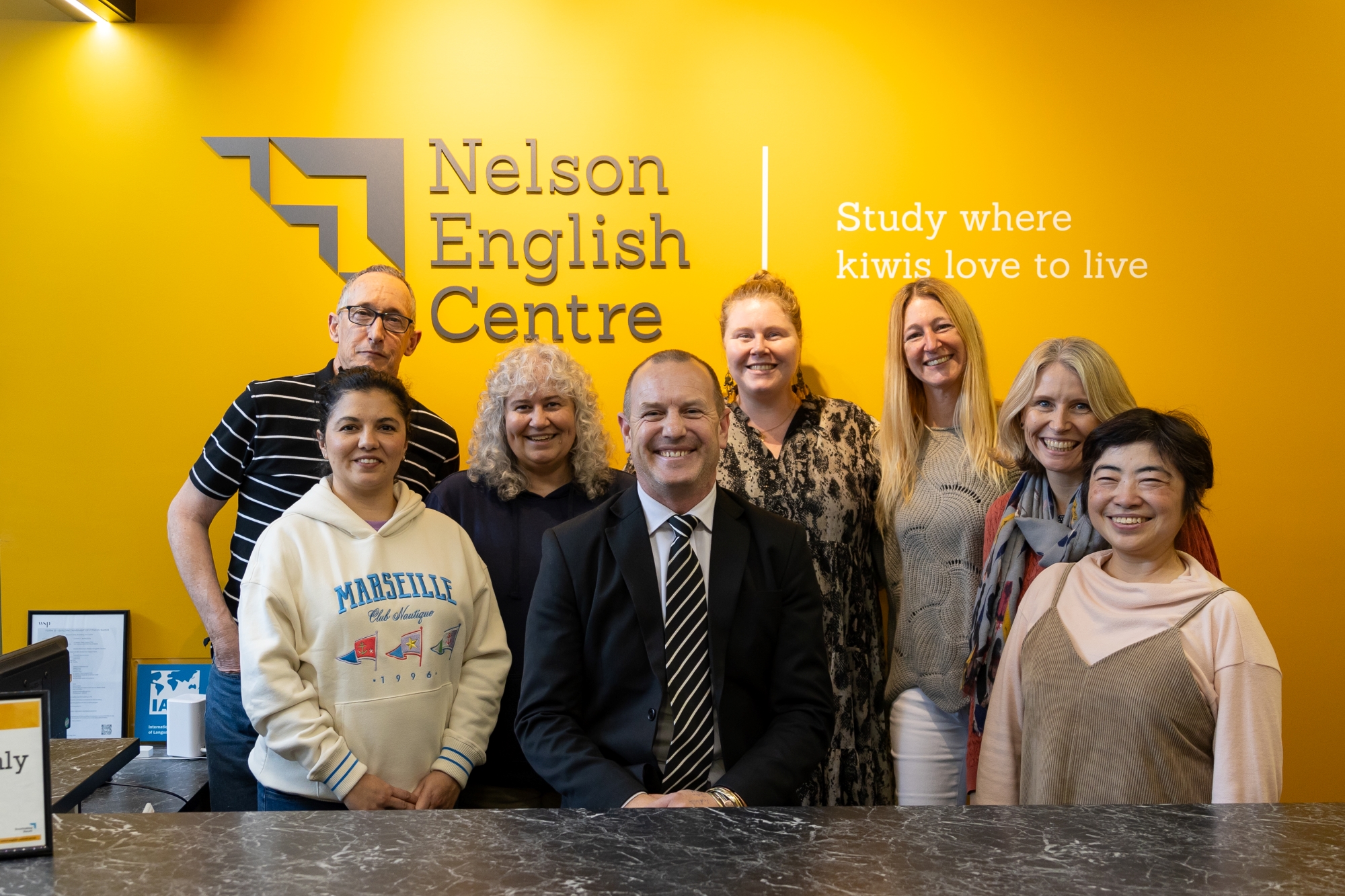English central


Nelson English Centre staff – Dave Loose, Maria Yeoman, Yolande Taylor, Miles Fitton (CEO), Erin Decker, Tina Staubli, Freya McClements and Eri Tanaka.
In the heart of Nelson City, young people from all over the world are coming to learn English. They are also embraced by the community, learning new cultures and taking their experiences of Nelson back out into the world. Located in the old Radio Nelson building on Selwyn Place, Nelson English Centre (NEC) is a thriving hub of activity, learning, fun and connection. Justin Eade learns more about it.
NEC was opened on Trafalgar Street in 1995 by James Upton, with no students. After two weeks, James saw a Japanese person on the street and approached her to ask if she wanted to learn English. She became the first student, and the school grew from there. It was James’ dream for students to have the time of their lives studying English in the Nelson region.
These days, the school can have up to 120 students in summer and about 80 in winter. The average age of students is 24 but can range from 14 to 80. The main nationalities are Japanese, Swiss, Thai, Chilean, Colombian and German.
Miles Fitton is the CEO of Nelson English Centre and says that, besides the core business of teaching English, pastoral care is a major part of the school’s ethos. He says NEC’s group of homestay families are a huge part of the success of the school, looking after the students and introducing them to Kiwi home life. And the school is constantly introducing students to new activities and hobbies, such as going to Victory Boxing, or arranging skydiving, kayaking, and sailing experiences – all supporting tourism companies in Nelson.
The school works with Auszeit Neuseeland and Study Nelson, companies that bring hundreds of German students and tourists to the Nelson region annually, contributing to the local economy.
Another unique aspect of the school is the free activities they offer every day after school, such as crocheting, jewellery-making, painting, ukulele, basketball, badminton, games nights, and barbecues at Tāhuna beach. Usually about 10 students will participate in an activity but there can be up to 20. There might be 80 to 90 students at a school barbecue or Thursday games night, where the atmosphere is very social.
Miles, who has been at NEC for 22 years, says keeping the staff employed and the school running through Covid was probably the greatest challenge he’s had, as their entire income was turned off overnight. But thanks to the great work from the amazing, committed staff they managed to make it through.
Miles says its wonderful having new students start every Monday, as there is always a new person to meet who has a new story. “I see students grow in confidence which spills over from their English into their whole outlook on life - we have seen amazing changes in people. Seeing the students’ faces when I pick them up from the airport and take them along Rocks Road… they are gobsmacked by the beauty of our wonderful region.”
Teacher Emily Narbey has been at NEC for two and a half years and loves the environment there. She says the staff are friendly, fun, and full of life, and it doesn’t feel like a chore to be there, a vibe which translates to the classroom as well. “There’s this really beautiful exchange of ‘I’ll give you all I can about the English language, but in exchange I’m learning all about your country and culture and language’… and then those exchanges are happening between all the students as well.”
Emily says she sometimes forgets there’s nastiness outside in the world because at NEC everyone works together and there’s a real feeling of unity, harmony, and acceptance.
On Tuesdays, Emily runs a jewellery class using polymer clay, where students can make earrings, pendants or key rings. What began as a hobby for her has become something she loves passing on to others. Similarly, she enjoys face-painting and balloon-twisting, which the students also love.
The Thursday games nights are popular, they play Uno, Cluedo, chess, beer pong, and other games. “It’s a nice opportunity for the students to hang out without the pressure of the classroom,” says Emily.
Sometimes, teachers will also informally take students on excursions, like to Kapa Haka competitions, or to local theatre productions. The students love the extramural activities, and the game nights can be a real highlight of their week.
“I love coming to work, but it will be for a different reason each day… it might be that I have something really exciting in my life that I want to share with my amazing colleagues, or I’ve got a good relationship with a student, and I want to see what they’re up to, or I’ve got something cool planned for my classes. It’s a good vibe, a great community, it feels very supportive.”
Another teacher Dave Loose has been at NEC for 13 years, and says what he likes about working there is meeting new students, working with the awesome staff, and helping the students improve their English to reach their life goals. “Every day is different… teaching can constantly be improved, and I like the fact that whatever I did yesterday, I can probably do it better tomorrow. One of the hardest things is you meet some really good people and then they leave, often to the other side of the world, and you don’t see them again.”
Dave teaches ukulele in after-school classes, even though he’s only been playing it for two or three years himself. “I’m better than a beginner, but still learning myself. I really enjoy that on a Wednesday afternoon some of the students come in and they are just stunned to learn that they can play ukulele too.”
Dave says it’s an opportunity for students to learn a new skill, but also to practice their English and interact with others. He says it’s a pretty good deal for the students, it’s fun, and some of them really take to it and get super enthusiastic, buy their own instruments, and get really good, “Young fingers learn fast.” Some of them even play at their graduation speeches in front of everybody and he has arranged for half a dozen or so students to buy their own ukuleles in town.
Dave really enjoys coming to work, because of the staff, and the challenge of doing something that’s helping the students make a transition from English as a subject to English as a tool for their life. “They can travel and meet and converse with others. I can’t think of anything else I’d rather do… it’s a job I really enjoy.”
Minami Furumaya is a student from Japan who wanted to come to New Zealand, so went through a Japanese agency who recommended ‘Sunny Nelson’ and NEC as a really warm and welcoming school. She says Nelson is a great little town – nice and slow, and comfortable. When she’s out walking, people are friendly; one lady she met out walking even told her all about her dog. “It was nice because it’s not a common thing for this to happen in Japan and it made me happy.”

It’s been really helpful to Minami’s English being here because every day she is talking to the other students in English, or the teachers, who can correct their answers, and even show them slang or something related to the news, making it really good practice.
“Even if we’re not in the same class, we can talk with and communicate with anyone and everyone here, and the teachers are so welcoming.” Minami is taking crochet classes and has even made her own socks. She also loves ukelele class.
Another student, Abdullah Hamad from Saudi Arabia, has been in Nelson for 11 months and loves the range of activities. He says the teachers are nice, and he enjoys being able to mix with many nationalities. In terms of language schools… “Before I couldn’t really speak English, but now I’m in the intermediate class and soon I’ll go to the IELTS class. So, for me, it’s been great.”
Abdullah does many extra-mural activities… games night is his favourite, but he also enjoys poker night, Latin dance classes, and the barbecues in summer… going to Tāhuna Beach, where some of the students go swimming in the sea. He finds the community and environment here at the school great, and New Zealand people, in general, really friendly.

Linda Scheuner, from Germany, graduated in June this year and decided to spend a year travelling and working in New Zealand. She found out about NEC though Auszeit Neuseeland, who asked her if she wanted to come to the school for a few weeks before starting her work and travels here. She thought ‘Why not? It’s always good to improve English skills.’
Nelson appeals to her because it’s not a big city and you can reach everything by foot. She says there are so many good spots like the Centre of New Zealand, the Boulder Bank, and the beach, noting that everything is beautiful, and everyone is so kind and friendly.
In terms of learning English, she says, “I talked about my English skills with my host mother a couple of days ago and she said I had already improved in just a few weeks. The school is good because in classes you have a lot of discussions and fun and you learn actively. The teachers are kind, and they show you where your faults are but not in a way you feel judged… you want to improve and that’s a good thing.”
Linda has also joined the crochet class and water-colour painting and says these have been good just to relax and to meet other people. She also took part in boxing, with other people of all ages, and found it quite exhausting, but fun.

Linda likes the rule that you have to speak English at NEC. She says in another school she was at, they didn’t have that rule, so she always talked German with German people. “It’s a good thing that here you have to talk in English, and also every day you meet new people, and you learn just by talking to them.”
There’s a thriving scene happening in Nelson’s heart, encouraging tourism, and enriching Nelson’s diversity with hundreds of young foreign people every year experiencing the beauty and charms of Nelson. “If we can continue James’ dream of providing a high-quality English school giving students the time of their lives in the Nelson region, then we are doing the right thing,” says Miles.
